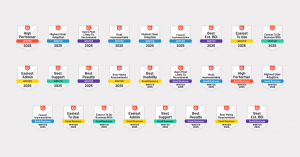Engineering firms operate in a financial landscape that’s markedly different from traditional businesses, yet many continue to rely on generic accounting software that wasn’t designed for their unique challenges.
The complexity of project-based revenue recognition, multi-phase billing cycles, and intricate cost allocation requirements demands specialized financial tools that can keep pace with engineering workflows.
Generic accounting solutions often force firms into workarounds that compromise accuracy and efficiency, creating blind spots that can hurt project profitability. The stakes are particularly high in engineering, where margin erosion can occur gradually until it’s too late to course-correct.
Choosing the right accounting software isn’t just about managing books, it’s about gaining the financial intelligence necessary to thrive in a competitive marketplace.
What Makes Engineering Firm Accounting Unique?
Engineering firms face accounting challenges that distinguish them from virtually every other industry. Project-based revenue creates complex recognition scenarios where work completed doesn’t always align with billing cycles, and percentage-of-completion accounting becomes essential for accurate financial reporting. The intricate relationship between labor hours, project phases, and deliverables requires sophisticated tracking mechanisms that generic accounting software simply doesn’t provide.
Cost allocation presents another layer of complexity unique to engineering practices. Overhead costs must be distributed across multiple projects while maintaining compliance with various regulatory and contractual requirements. Direct costs, indirect costs, and administrative expenses all require careful categorization and tracking to ensure accurate project profitability analysis.
Engineering firms also need to manage complex billing arrangements, including retainer agreements, milestone-based payments, and change order processing that can significantly impact cash flow and revenue recognition.
The regulatory environment adds further complexity, with engineering firms often subject to government contract compliance requirements, professional liability considerations, and industry-specific reporting standards that generic accounting software may not accommodate effectively.
Essential Features to Look For in Engineering Accounting Software
Real-Time Visibility
Real-time profitability and project reports provide the critical insights engineering firms need to measure performance and make data-driven decisions. Without immediate access to current financial data, firms operate in a reactive mode, discovering problems only after they’ve already impacted profitability.
Real-time visibility enables proactive management, allowing teams to identify trends, adjust resource allocation, and address issues before they escalate into significant financial challenges.
Modern engineering accounting software should provide dashboard-style reporting that presents key performance indicators at a glance, including project profitability, utilization rates, and cash flow projections. This immediate access to financial intelligence empowers engineering leaders to make informed decisions about resource allocation, project prioritization, and strategic planning initiatives that drive long-term success.
Granular Financial Tracking for Each Stage
Engineering projects demand detailed cost, transaction, and revenue tracking at every stage to ensure profitability targets are met throughout the project lifecycle. Generic accounting software typically treats projects as single entities, but engineering work involves distinct phases with different cost structures, resource requirements, and profitability profiles.
Effective granular tracking allows firms to monitor performance at the task level, identifying which activities generate the highest returns and which consume disproportionate resources.
This detailed visibility enables more accurate project scoping, better resource planning, and improved profitability management across the entire portfolio of active projects.
All-In-One Financial Management
Engineering firms benefit significantly from comprehensive financial management tools that handle operational costs, business expenses, bills, and purchase orders within a single integrated platform. Managing these different financial elements through separate systems creates inefficiencies, increases the risk of errors, and makes it difficult to maintain a complete picture of financial performance.
Integrated financial management eliminates the need for manual data transfer between systems, reduces administrative overhead, and ensures that all financial information flows seamlessly through the organization. This comprehensive approach provides better control over cash flow, more accurate financial reporting, and improved visibility into the total cost of operations.
Optional but Valuable Accounting Add-ons for Engineering Firms
Data Analytics
Advanced data analytics capabilities transform raw financial data into actionable business intelligence that drives strategic decision-making. Sophisticated reporting and analysis tools help engineering firms identify trends, optimize performance, and uncover opportunities for improved profitability. Look for platforms that offer customizable dashboards, automated reporting, and predictive analytics that can forecast project outcomes based on historical performance data.
Software Integration Capabilities
Seamless integration with existing software ecosystems eliminates data silos and creates efficient workflows across the organization. The best solutions offer pre-built integrations with popular engineering software while maintaining flexibility for custom connections.
Project Information Management
Centralized project information management (PIM) ensures that financial data remains connected to project context, enabling better decision-making and improved collaboration. Comprehensive project information systems complement financial tracking with detailed project documentation, communication tools, and document version control that keeps all stakeholders aligned throughout the project lifecycle.
Human Resource Management
Integrated HR management streamlines staff administration and resource planning for engineering firms managing complex project requirements. Advanced HR modules provide tools to track staff availability, record professional qualifications and technical skills, and automate leave policies with direct timesheet integration. These capabilities ensure that project managers have real-time visibility into team availability while maintaining accurate records of certifications, licenses, and specialized expertise that are critical for project staffing decisions.
Customer Relationship Management
Comprehensive customer relationship management (CRM) ensures that client interactions and project financials remain aligned, supporting better client service and improved project profitability. Integrated CRM capabilities provide a complete picture of client profitability and relationship health by connecting client management directly with financial tracking and project performance data.
Questions to Ask Before Choosing an Engineering Accounting Software
Does the Software Support Project-Based Accounting?
Engineering firms require software that understands project-based revenue recognition, multi-phase billing, and complex cost allocation scenarios. Generic accounting solutions often struggle with these requirements, forcing firms into inefficient workarounds.
Can it Handle Percentage-of-Completion Accounting?
Accurate percentage-of-completion accounting is essential for engineering firms managing long-term projects. The software should automate these calculations while maintaining compliance with accounting standards and contractual requirements.
How Does it Integrate with Existing Systems?
Engineering firms use specialized software for design, project management, and client communication. The accounting software should integrate seamlessly with these existing systems to eliminate data silos and improve operational efficiency.
What Level of Customization is Available?
Every engineering firm has unique processes and requirements. The accounting software should offer sufficient customization options to accommodate these specific needs without requiring extensive modifications or workarounds.
Elevate Your Financial Tracking Process with Total Synergy
Total Synergy’s financial tracking solution is built on 25 years of experience supporting architecture and engineering firms. We make it easier to manage projects, track finances, and stay profitable without getting bogged down in clunky tools.
Our platform is designed for the real challenges A&E firms face, from complex project accounting to advanced reporting. With the right tools in place, financial management becomes a strength, not a struggle.
Ready to transform your financial management approach? Book a demo today and discover how purpose-built financial software can unlock your engineering firm’s full potential.




